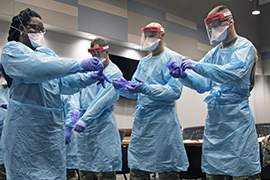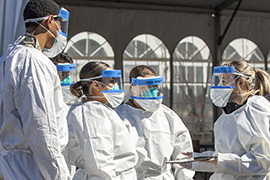- Slug: BC-CNS-Gear Fears,910.
- 2 photos available (thumbnails, captions below)
By Christopher Scragg
Cronkite News
WASHINGTON – Arizona hospitals are rationing and ordering workers to reuse protective equipment like masks, gowns and eyewear in an attempt to head off shortages expected with the surge in COVID-19 patients in the state.
While some health care workers said they understand the reasoning, they worry that the shift in standard operating procedures will end up putting them, their families and their patients at risk.
“This is the definition of abuse,” said Mark Coleman, a registered nurse in Phoenix. “To quote a physician’s post going around: ‘It’s like we’re in a Soviet-era nightmare or something. How are we a First World country that’s suffering from this issue?'”
Nurses at several Arizona hospitals said they have been told to reuse N95 respirators, their main defense against “aerosolized” coronavirus that they could inhale during procedures like inserting a breathing tube for a patient.
“In the previous years of my career, if you were caught reusing a mask … you would get in trouble because that was not considered appropriate protection if you had already worn it,” said Rachel Basham, an emergency room nurse in Phoenix. “We know that they are effective for a very short period of time, and now we are wearing those masks for a full 12-hour shift.”
In a survey last week by the Arizona Nurses Association, 77% of 303 participants disagreed or strongly disagreed when asked if they have enough personal protective equipment, or PPEs, to protect patients. Only 12% agreed they had sufficient gear.
Basham, who has been treating patients with coronavirus and reusing masks for entire shifts, said she can understand the need to conserve gear “because we’re in a pandemic.”
“In rationing PPE, it makes sense to me because if we know we don’t have enough N95s, if I dispose of one every time I go in the room like I normally would, then that’s 10 coworkers that have no masks tomorrow,” she said. “In some ways it makes sense to me because we’re doing the most good for the most people that we can.”
But she has been disturbed by how quickly hospitals and governments have shifted policies for protective equipment, saying it’s hard to decipher what is “new information coming out about this virus and what is evolving truth based on convenience for the hospital.”
She noted that an N95 mask is typically no good after 30 to 60 minutes of use, “but now suddenly it’s like, ‘Oh, we’re going to give you one N95 per shift and it will be fine, you just make sure if it gets wet you ask for a new one.'”
Earlier this month Banner Health encouraged workers in its Arizona hospitals to reuse single-use masks, gowns and eye-wear, “between patients if not visibly soiled or contaminated for up to 2 hours” according to hospital memos. In an emailed statement, a Banner Health spokeswoman said the new policies for PPE are based on Centers for Disease Control and Prevention guidelines.
“Our infection prevention experts are making PPE use recommendations based on CDC and WHO (World Health Organization) guidelines,” the statement said. “These recommendations are intended to keep health care workers safe and avoid unnecessary use of PPE.”
But Coleman said PPE guidelines have been loosened by the CDC “to the point where they’re saying, ‘If you don’t have a mask, use a bandana.'”
Michael Kouridakis, a registered nurse in New Jersey, called it a nationwide shortfall that should not have come as a surprise.
“Hospitals were not prepared, the federal government was not prepared,” Kouridakis said. “The CDC is excusing the lack of preparedness by government and hospitals and putting staff at risk.”
Dr. Amesh Adalja, an expert in infectious disease at Johns Hopkins University, agreed.
“I don’t think hospitals in general were well prepared for pandemic preparedness,” Adalja said. “This is something that often goes through the cycles of panic and neglect and we’re seeing major concerns about the security of the supply chain for PPE, but this is something we could’ve predicted.”
Nurses say the shortage of PPE will affect both them and their patients. In the Arizona Nurses Association survey, 80% agreed or strongly agreed that they are concerned they will catch the virus.
“I really think that I will end up contracting the coronavirus, not because I didn’t mind my P’s and Q’s and do all the right procedures, but just because I’m reusing masks,” Basham said.
Coleman said that has the potential of taking health care workers out of action just as coronavirus patients increase.
“My biggest fear is that we’ve been so inadequately protected so far that in the first wave of illness it could potentially take out 20% of our healthcare providers,” Coleman said.
That could also put patients at risk by making health care workers carriers.
“I’m not going to hurt people on accident because we don’t have enough masks,” Coleman said. “When I go to ICU, I’m going to wear an N95 in every room and if they don’t like that, they don’t get me, that’s it.”
Arizona Nurses Association executive director Robin Schaeffer said the group’s survey proved nurses are dedicated to their patients, despite the risks they face.
“They feel they don’t have sufficient protective equipment, they’re concerned that they will get COVID-19 yet 3 in 4 of them, over 75% said they would put their concerns aside and continue caring for patients during this public health crisis,” Schaeffer said. “This is the heart of a nurse.”
^__=
Web links:
_ CDC facemask guidance: https://www.cdc.gov/coronavirus/2019-ncov/hcp/ppe-strategy/face-masks.html
_ Nurses’ association survey: https://azna.informz.net/informzdataservice/onlineversion/ind/bWFpbGluZ2luc3RhbmNlaWQ9MjkxMjU1NiZzdWJzY3JpYmVyaWQ9MzY0MjgwMjI0
_ Arizona COVID-19 cases: https://www.azdhs.gov/preparedness/epidemiology-disease-control/infectious-disease-epidemiology/index.php#novel-coronavirus-home
^__=
Florida National Guard members work with local hospital staff on putting on and taking off personal protective equipment (PPE) during a coronavirus response drill in Broward County, Florida, earlier this month. (Photo by Sgt. Leia Tascarini/The National Guard)
A health department worker trains New York Army National Guard members to register people on iPads at a drive-through COVID-19 testing center near New Rochelle, an area hard hit by the coronavirus.(Photo by Sgt. Amouris Coss/The National Guard)[/caption]

